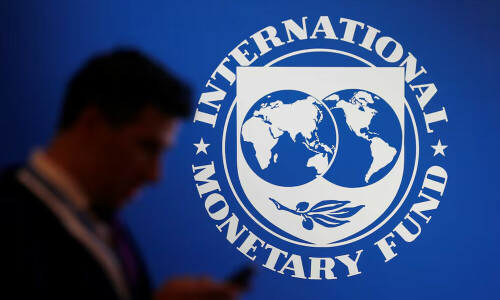Global Finance Leaders Converge in Washington Amid Trade War Concerns
This week, Washington D.C. will host a gathering of hundreds of global finance leaders, each focused on securing trade agreements.
The bi-annual meetings of the International Monetary Fund and World Bank Group serve as hubs for both high-profile multilateral policy discussions and individual meetings between finance ministers seeking to finalize deals related to project funding, foreign direct investment, and debt restructuring for developing nations.
This year, the primary focus shifts from policy alignment on subjects such as climate change, inflation, and financial aid for Ukraine, to the widespread implications of tariffs.
Specifically, attendees will address strategies to alleviate or minimize the adverse effects of the significant import duties imposed by US President Donald Trump since his return to office in January.
The spotlight is expected to be on the new US Treasury Secretary, Scott Bessent, who is spearheading tariff negotiations for Trump. His commitment to the IMF and World Bank is currently uncertain.
Josh Lipsky, a senior director at the Atlantic Council’s GeoEconomics Center, noted, “Trade conflicts will dominate discussions, alongside bilateral talks pursued by nearly every nation. This transforms the Spring Meetings into a forum primarily defined by a single issue.”
IMF Forecasts Affected
Trump’s tariffs are projected to negatively impact the IMF’s forthcoming economic forecasts, scheduled for release on Tuesday, potentially increasing the debt pressures on developing countries.
IMF Managing Director Kristalina Georgieva mentioned that the World Economic Outlook will feature “significant reductions, though not a recession,” largely due to heightened uncertainty and market instability resulting from tariff-related disruptions.
Georgieva acknowledged the continued functionality of the global economy but cautioned that growing apprehension about trade-related disturbances and recession fears could impede economic advancement.
Lipsky raised concerns about whether the dollar will sustain its status as a safe-haven asset, especially after Trump’s tariffs triggered a sell-off in U.S. Treasury bonds.
The IMF and World Bank meetings, including a concurrent gathering of G20 finance ministers, have historically been crucial for coordinating strong policy responses during crises like the COVID-19 pandemic and the global financial crisis of 2008-2009.
Policy experts suggest that this time, delegations, accompanied by trade ministers, will prioritize bolstering their domestic economies.
Nancy Lee, a former US Treasury official and current senior policy fellow at the Center for Global Development in Washington, stated, “The emphasis on multilateral development bank reform and sovereign debt architecture will likely be overshadowed.”
Bessent’s Role in Tariff Discussions
Japan, facing pressure from Trump’s tariffs of 25% on automobiles and steel, and reciprocal tariffs potentially affecting 24% of other goods, is particularly motivated to swiftly finalize a tariff agreement with the U.S.
Finance Minister Katsunobu Kato of Japan is anticipated to meet with Bessent during the IMF and World Bank meetings to further negotiations, which are reportedly more advanced than those of other nations, involving Trump’s participation.
South Korean Finance Minister Choi Sang-mok has also accepted Bessent’s invitation to discuss trade this week, as South Korea seeks to postpone the imposition of 25% tariffs and collaborate with the U.S. on shared interests like energy and shipbuilding.
Several participants are questioning the Trump administration’s dedication to the IMF and World Bank.
Project 2025, a policy plan that has influenced many of Trump’s governmental changes, suggests the U.S. should withdraw from these institutions.
Lee commented, “I believe Secretary Bessent has a critical role in addressing fundamental questions at these meetings, especially regarding whether the U.S. views support for MDBs as beneficial.”
U.S. Financial Commitment
World Bank President Ajay Banga reported having productive discussions with the Trump administration but remains uncertain about the $4 billion U.S. contribution to the bank’s fund for the world’s poorest countries, pledged last year by the prior administration.
Banga is also expected to elaborate on the bank’s revised energy financing strategy, which now includes nuclear energy and more gas initiatives, as well as an increased focus on climate adaptation projects.
Bessent recently supported the IMF’s $20 billion loan program for Argentina, signaling U.S. backing for the country’s economic reforms and expressing a preference for such alternatives over bilateral loan agreements with China.
Three former Treasury officials, Meg Lundsager, Elizabeth Shortino, and Mark Sobel, argued in The Hill that the IMF provides the U.S. with significant economic leverage at minimal cost, highlighting that if the U.S. reduces its involvement with the IMF, China stands to gain.



Comments (0)
No comments yet. Be the first to comment!
Leave a Comment